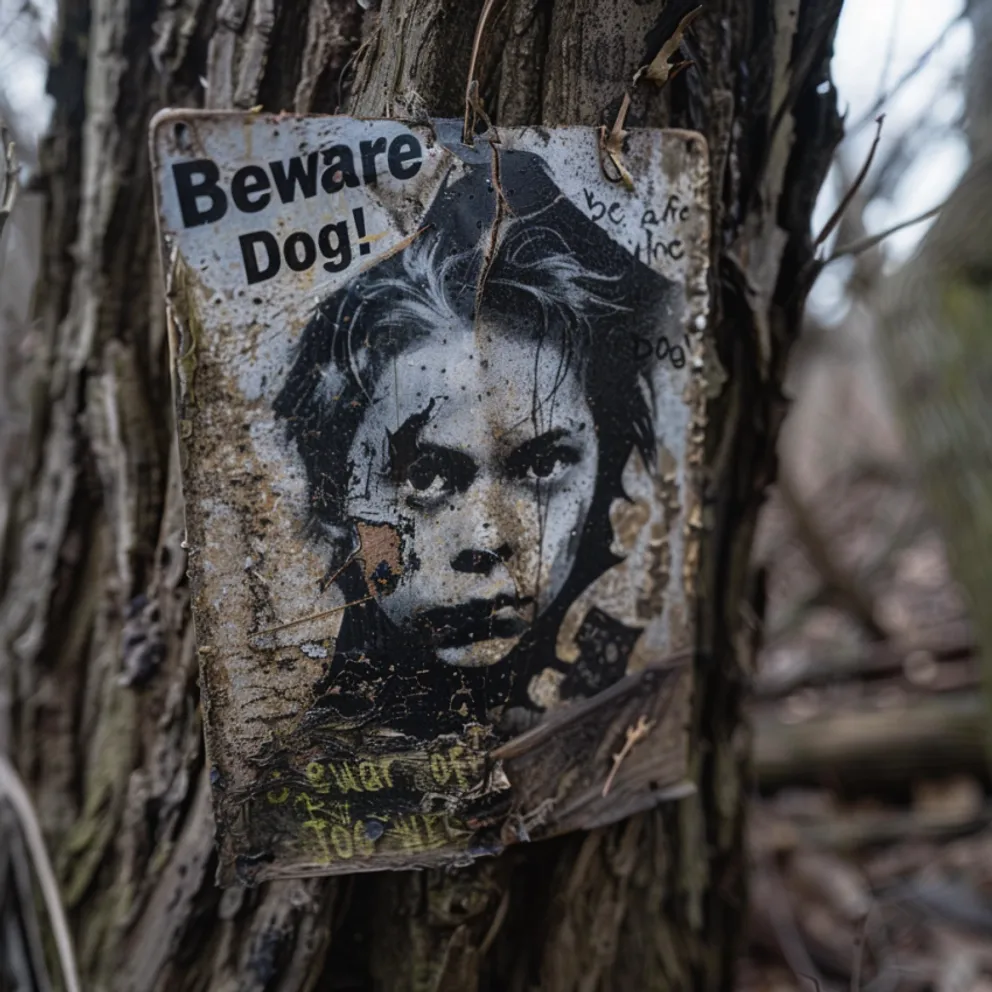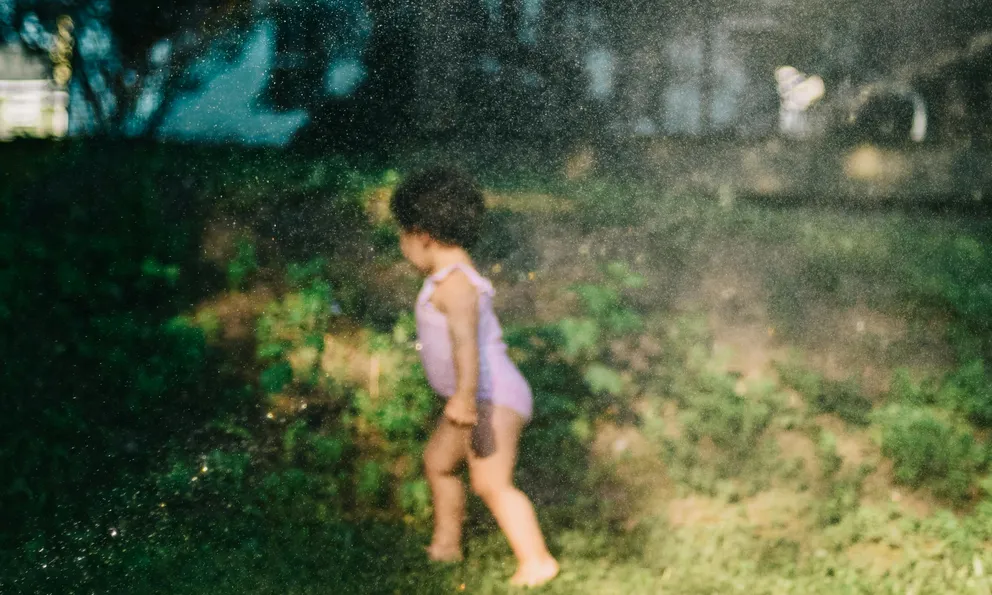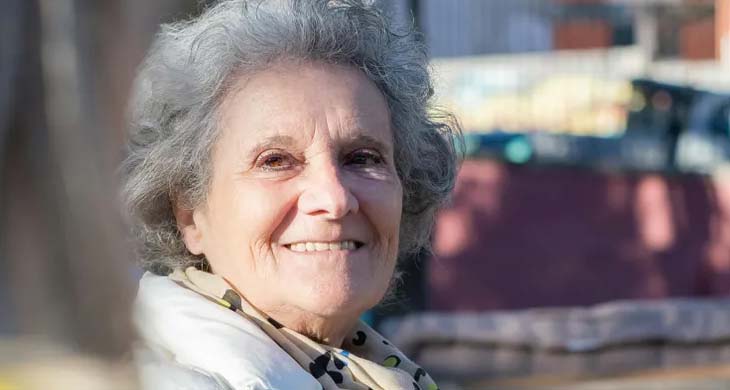When I saw the poster with my son’s name and face, I felt a chill run down my spine. Little did I know that calling the number would uncover deep-seated secrets and stir emotions I never imagined, leading to a neighborhood showdown that threatened to tear us apart.
I remember the morning like it was yesterday. Danny was running around the backyard, his laughter filling the air as he kicked a ball against the fence. Tom was inside, making breakfast. I was sipping my coffee, enjoying the early sunshine, when something caught my eye.
It was a poster, taped to the old oak tree at the corner of our street. Curious, I walked over, my heart sinking as I got closer. Danny’s face stared back at me, smiling in the photo I’d posted on Facebook just last week. Above his picture, in bold black letters, it read: “Beware of the Dog!”

“What the heck?” I muttered, my hands trembling as I tore the poster down. Beneath Danny’s photo, the words, “Screams, runs, disrespects elders, dangerous,” screamed up at me. Rage bubbled up inside me. Who would do this? Who would call my son dangerous?
I stormed back into the house, clutching the poster. “Tom! Look at this!” I shouted, waving the paper in front of him.
He took it, eyes narrowing. “This is sick. Who’d do something like this?”
Helen. It had to be our sixty-year-old neighbor, Helen. She’d always been annoyed by Danny’s noise. I remembered her scowling at us from her porch, the way she’d complained about his ball ending up in her yard.
“It’s Helen,” I said, my voice steady with conviction. “It’s got to be.”
Tom frowned. “Are you sure? I mean, she’s never done anything like this before.”
“Who else hates Danny’s playing that much?” I replied. “I’m going over there.”
Before I did anything else, I called the number on the poster, my heart racing. When a robotic voice answered, directing me to leave a message, I felt sick to my stomach.
I wasn’t going into this confrontation unarmed. Marching out of the house, I headed straight for Helen’s door, my pulse pounding in my ears.
I knocked hard, anger giving my hand strength. It took a few moments, but eventually, Helen opened the door, her face creased with confusion and then irritation.
“Amy, what’s all this noise about?” she asked, her tone clipped.
I held up the poster. “This. Did you do this?”
Her eyes widened for a split second before she composed herself. “I don’t know what you’re talking about.”
“Don’t lie to me, Helen!” I snapped. “I know you’ve complained about Danny before. But this is going too far.”
Helen’s face reddened. “I didn’t make that poster.”
“Yes, you did,” I insisted. “You’re the only one who’s ever had a problem with Danny.”
She shook her head, lips pressed into a thin line. “You need to control your son. He’s always screaming, always in my yard. I can’t stand it anymore.”
“And this is how you deal with it?” I shouted, waving the poster again. “By humiliating a five-year-old?”
Helen’s eyes flashed with anger. “You don’t understand, Amy. I moved here to have some peace in my retirement. Not to be disturbed every single day by your son’s noise.”
I took a step back, trying to control my shaking hands. “You had no right,” I said, voice low but firm. “You had no right to do this.”
For a moment, we stood there, staring at each other, the air thick with tension. Finally, Helen looked away, her shoulders slumping.
“I’m sorry,” she muttered. “I just… I just wanted some quiet.”
“Then talk to us like an adult,” I said. “We could have worked something out. But this? This is unacceptable.”
Helen nodded, looking ashamed. “I know. I know. I was just so frustrated.”
I took a deep breath, trying to calm the storm inside me. “If you ever have a problem again, come to us. Don’t do something like this. Ever.”
Helen nodded again, and I turned, the poster crumpled in my hand. My mind raced with what to do next. Should we involve the police? Could I even trust Helen not to pull something like this again?
I didn’t have the answers, but I knew one thing for sure: I had to protect Danny. No matter what.
Neighbors started gathering, drawn by the raised voices from our confrontation. Some whispered among themselves, while others openly took sides. It wasn’t long before the whole street was buzzing.
“What’s going on?” Mrs. Jenkins from across the street asked, her face etched with concern.
“Helen’s been harassing Danny,” I said, showing her the poster. “Look at this!”
Mrs. Jenkins gasped. “That’s just cruel!”
But not everyone agreed. “To be fair,” Mr. Patel chimed in, “Danny can be quite loud. It’s not unreasonable to want some peace.”
Tom stepped forward then, having come over to join me outside Helen’s house. His voice when he spoke was calm but firm. “We need to discuss this as a community. Let’s have a neighborhood meeting. Tonight. Our place.”
There were murmurs of agreement and dissent, but eventually, everyone agreed to meet that evening. By sunset, our backyard was filled with neighbors. Danny’s play area, usually a symbol of joy, now stood as the center of our conflict.
I opened the meeting. “Thank you all for coming. We need to talk about what’s been happening and find a way forward.”
Helen stood with her arms crossed, defensive. “I just want some peace. Is that too much to ask?”
Tom nodded. “We understand that, Helen. But targeting Danny was wrong. We need to find a better way to address your concerns.”
The conversation grew heated. Mrs. Jenkins spoke passionately about community spirit and supporting each other. Mr. Patel reiterated the need for quiet. The divide in our neighborhood was glaring.
Then, James, another neighbor, stood up. “I had a similar problem years ago,” he began, his voice steady. “Kids were always playing in my yard. It drove me crazy. But I realized, after a talk with their parents, that we could find a compromise.”
James’s story seemed to resonate. He talked about understanding, patience, and the joy children bring to a community. As he spoke, Helen’s expression softened.
“I never meant to hurt anyone,” she said quietly. “I just… I didn’t know how to handle it.”
I took a deep breath. “We can work this out, Helen. How about setting quiet times? Danny can play outside during certain hours, and we’ll keep it down during others.”
The tension in the air eased as heads nodded in agreement. Helen looked around, seeing the support and understanding in her neighbors’ faces. “I’m sorry,” she said, her voice cracking. “I regret what I did.”
I stepped forward. “We appreciate that, Helen. Let’s move forward together.”
The meeting ended on a hopeful note. We agreed to create community guidelines to address such issues in the future. Helen even offered to help set up and manage a neighborhood watch program. It wasn’t perfect, but it was a start.
A few days later, a letter appeared in my mailbox. Inside was a heartfelt apology from Helen, along with a photo of her as a young girl, playing in her own backyard.
The note revealed a painful truth: Helen once had a son who passed away young. Danny’s joy reminded her of her lost child, stirring emotions she hadn’t faced in years.
Tears welled up as I read the letter. It all made sense now. Helen’s actions were rooted in pain, not malice. I decided to reach out, inviting her to spend time with Danny. Maybe, just maybe, they could heal together.

“Tom,” I said, holding the letter. “We need to talk to Helen.”
He read the note, his eyes softening. “Let’s go.”
We walked to Helen’s house, knocking gently this time. When she opened the door, I held up her letter. “Thank you for this,” I said. “I think we both have a lot to learn from each other.”
Helen’s eyes filled with tears. “I’d like that.”
And so, justice was served not through punishment, but through understanding and healing. Our fractured community began to mend, stronger than before.
What would you have done? If you enjoyed this story, here’s another one for you about a grumpy widower who finds a new purpose helping a struggling single mother who lives next door.
This work is inspired by real events and people, but it has been fictionalized for creative purposes. Names, characters, and details have been changed to protect privacy and enhance the narrative. Any resemblance to actual persons, living or dead, or actual events is purely coincidental and not intended by the author.
The author and publisher make no claims to the accuracy of events or the portrayal of characters and are not liable for any misinterpretation. This story is provided “as is,” and any opinions expressed are those of the characters and do not reflect the views of the author or publisher.
